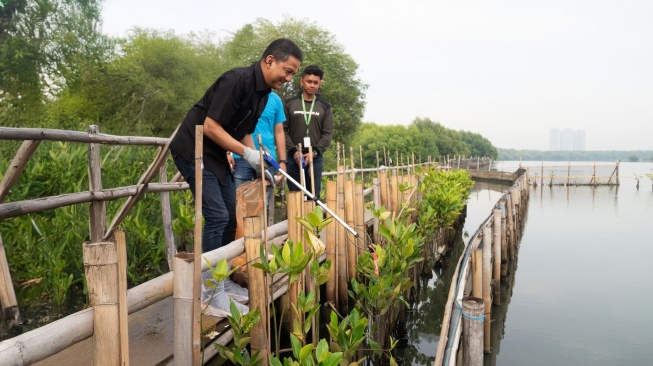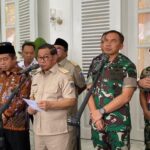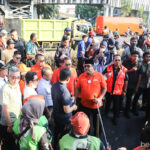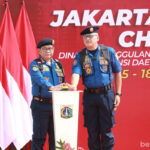For 27 years, driven by the spirit of “Synergy to Advance the Nation,” Bank Mandiri has consistently affirmed its role as a strategic partner to the Government in improving the quality of life for the community. This commitment is realized through the Social and Environmental Responsibility (TJSL) program titled “Clean Mandiri Action,” a collective movement to optimize the function of rivers, reservoirs, mangrove forests, and beaches, ensuring the environment remains clean, healthy, and sustainable.
As a concrete step, the bank held the Clean Mandiri Action simultaneously at 27 strategic points across Indonesia, ranging from rivers and mangrove ecotourism parks to dams and beaches. The activity involved more than 1,350 participants, consisting of Bank Mandiri employees and local communities, who worked together to clean the water areas and restore their function as centers of social and economic activity.
The Director of Bank Mandiri explained that this synergy between the community and the bank’s employees aims to restore the function of water bodies as a source of life, from providing clean water and flood control to supporting fish farming, agricultural irrigation, and tourism destinations.
“As an agent of change, Bank Mandiri wants Indonesia’s water bodies to be able to serve as a foundation for regional economic resilience. To strengthen the sustainable impact, we are collaborating with Waste4Change, a technology-based waste management company founded by an alumnus of the Young Mandiri Entrepreneur program,” the Director stated in an official release.
He further noted that Waste4Change has successfully managed up to 12,000 tons of waste per year. Therefore, its presence is expected to ensure that waste management is more measurable, responsible, and based on modern technology.
Furthermore, he emphasized that this program is part of the consistent implementation of the Environmental, Social, and Governance (ESG) principles by Bank Mandiri. “We believe sustainability can only be achieved through synergy. Clean Mandiri Action is a joint invitation to change behavior, build a greener ecosystem, and create a healthy environment for future generations,” he explained.
This initiative also aligns with the national development goals, particularly the agenda of strengthening inclusive, sustainable, and environmentally-based economic development. Through the Clean Mandiri Action, Bank Mandiri strives to support the creation of healthier living spaces while increasing the productivity of communities whose livelihoods depend on water resources.
“With this step, Bank Mandiri, present for more than two decades, has not only contributed to the financial sector but has also become part of a tangible solution to preserve the environment, encourage community participation, and strengthen the foundation of sustainable development in Indonesia,” he concluded.
Bank Mandiri
Bank Mandiri is a major state-owned bank in Indonesia, established in 1998 as part of the government’s response to the Asian Financial Crisis. It was formed through the merger of four ailing state-owned banks to create a stronger, more stable financial institution. Today, its historic headquarters in Jakarta, the Bank Mandiri Museum, is housed in a restored Dutch colonial building that showcases the nation’s banking heritage.
Clean Mandiri Action
“Clean Mandiri Action” is not a specific place or cultural site, but rather an Indonesian environmental movement and community initiative. It typically refers to local clean-up campaigns where volunteers gather to clean public spaces like beaches, rivers, and parks. The movement embodies the spirit of community self-reliance (“mandiri”) in addressing environmental issues.
Social and Environmental Responsibility (TJSL)
“Social and Environmental Responsibility (TJSL)” is not a physical place or cultural site, but an academic program or principle. It is a core component of the curriculum at Thomas Jefferson School of Law (TJSL) in San Diego, focusing on training lawyers in ethical practices, public interest law, and sustainability. The program reflects a modern commitment within legal education to address societal challenges and promote justice beyond traditional legal practice.
Environmental, Social, and Governance (ESG)
“Environmental, Social, and Governance (ESG) is not a physical place but a set of criteria for evaluating a company’s ethical impact and sustainability practices. It emerged in the early 2000s from the United Nations’ “Who Cares Wins” report, building upon earlier concepts of corporate social responsibility. The framework assesses how an organization manages its environmental footprint, social relationships, and internal governance structures.”
Waste4Change
Waste4Change is an Indonesian social enterprise founded in 2014 that provides responsible waste management services. Its mission is to reduce waste sent to landfills by offering solutions like waste collection, recycling, and educational programs. The company promotes a circular economy and empowers communities to adopt more sustainable waste practices.
Young Mandiri Entrepreneur
“Young Mandini Entrepreneur” appears to refer to a modern Indonesian government program or initiative rather than a physical place or historical cultural site. It is part of a national movement to foster entrepreneurship and economic self-reliance among Indonesian youth. The program’s history is rooted in contemporary efforts to build a new generation of business leaders and support the country’s economic development.
Indonesia
Indonesia is the world’s largest archipelago nation, located in Southeast Asia, with a history deeply shaped by Hindu-Buddhist empires like Srivijaya and Majapahit, followed by centuries of colonial rule by the Dutch. It is renowned for its vast cultural and biological diversity, including thousands of islands, hundreds of ethnic groups, and iconic sites like the Borobudur Temple. The country declared its independence in 1945 and is now a vibrant republic known for its rich traditions, arts, and stunning natural landscapes from volcanoes to tropical beaches.
rivers
Rivers are natural flowing watercourses that have played a foundational role in human history, serving as the cradles for the world’s earliest civilizations such as those in Mesopotamia, Egypt, and the Indus Valley. They have been vital for transportation, agriculture, trade, and as a source of freshwater, shaping settlement patterns and cultural development for millennia. Today, they remain crucial for ecosystems, economies, and as enduring symbols in the cultural and spiritual life of societies worldwide.




![Ahmad Sahroni. [instagram]](https://asiacity.news/wp-content/uploads/2025/09/73283-ahmad-sahroni-150x150.jpg)

